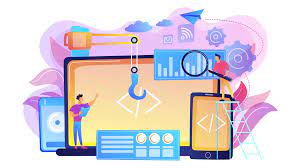The mobile app industry is booming and healthcare is no exception. There are over 350,000 health-related apps available on app stores, catering to a wide range of uses from appointment scheduling to chronic disease management. This trend is expected to continue, with the healthcare app market predicted to reach $60 billion by 2020.
The Power of Mobile Health Apps
Mobile health apps empower users to take charge of their health. Whether it's tracking fitness goals or connecting with a doctor virtually, these apps offer unprecedented convenience and flexibility. For healthcare providers, mobile apps can improve efficiency and streamline communication with patients.
Steps to Develop Your Healthcare App
Developing a healthcare app requires careful planning and execution. Here's a breakdown of the key steps involved:
-
Choose a Development Partner: Select a reputable healthcare app development company with a proven track record and experience building apps that comply with relevant regulations.
-
Get a Cost Estimate: Contact your chosen development partner to discuss your project and receive a cost estimate.
-
Refine Your Project Scope: Work with the development team to define the app's features and functionalities in detail. This will influence the final development cost.
-
App Development Begins: Once you approve the project scope and estimate, the development team will start creating prototypes, wireframes, and user stories.
-
Development Iteration: The development process is iterative, meaning the team will build the app in stages, gathering your feedback and making refinements along the way.
Types of Healthcare Apps
The vast array of healthcare apps can be broadly categorized into two groups: those designed for healthcare professionals and those designed for patients. Here are some of the most popular types:
-
Professional Healthcare Apps: These apps manage patient data securely and are HIPAA compliant. They may include features like appointment scheduling, electronic health records (EHR), and secure messaging.
-
Clinical Communication Apps: These apps enhance communication and collaboration among healthcare professionals within a hospital or clinic. Features may include secure messaging, file sharing, and integration with EHR systems.
-
Patient Communication Apps: These apps improve patient engagement and satisfaction by providing a platform for secure communication with doctors, appointment scheduling, and medication reminders.
-
Medical Records Apps: These apps allow patients to access and manage their medical records electronically, including visit summaries, lab results, and medication lists.
-
Risk Assessment Apps: These apps leverage machine learning to analyze patient data and identify potential health risks. They may integrate with wearables to track vital signs and other health metrics.
-
Barcode Scanning Apps: These apps utilize a smartphone's camera to scan medical records and medication barcodes, streamlining data entry and reducing errors.
-
Medication Dosage Apps: These apps help doctors calculate medication dosages accurately based on a patient's weight, age, and other factors.
Mobile Healthcare Apps for Patients
Patient-focused healthcare apps can be further categorized into wellness apps and medical apps. Here are some examples:
-
Telemedicine Apps: These apps allow patients to connect with doctors virtually for consultations, appointments, and follow-up care.
-
Fitness Apps: These apps help users track their workouts, monitor calorie intake, and set fitness goals.
Regulations to Consider Before Developing a Healthcare App
Developing a healthcare app requires strict adherence to data security and privacy regulations. HIPAA, GDPR, and other regulations are in place to protect patient information. Failure to comply with these regulations can result in app store removal and hefty fines.
Not all healthcare apps require the same level of compliance. Simple apps like calorie counters or meditation apps may not need to adhere to stringent regulations. However, any app that handles sensitive patient data must prioritize data security.
Here are some key regulations to consider:
-
HIPAA (Health Insurance Portability and Accountability Act): This act mandates the protection of patient health information (PHI).
-
GDPR (General Data Protection Regulation): This regulation applies to apps launched in the European market and requires user consent for data processing and data privacy controls.
-
HITECH (Health Information Technology for Economic and Clinical Health Act): This act strengthens HIPAA regulations and holds healthcare providers accountable for data breaches.
Ready to Build Your Healthcare App?
The world of healthcare apps is vast and ever-evolving. By understanding the different types of apps, the development process, and the relevant regulations, you can take the first step towards creating a successful healthcare app that meets a critical need.
If you're looking for a reliable healthcare app development partner, look no further than Tech Xpert - App Building Agency. Our team of experienced developers can help you bring your healthcare app vision to life.


No comments yet